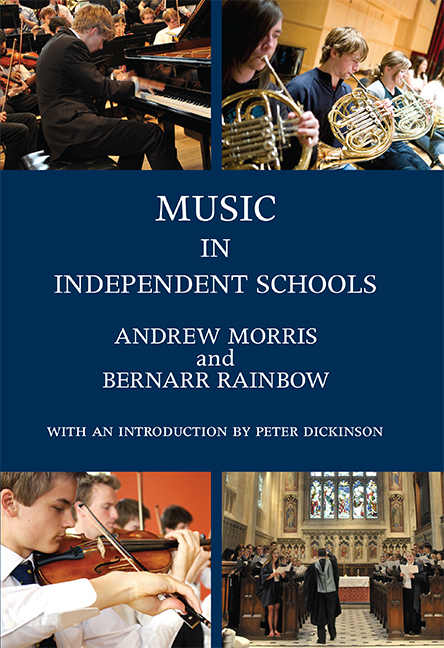Book contents
- Frontmatter
- Contents
- List of Plates
- General Editor's Foreword
- Editor's Introduction
- Biographical Notes
- List of Abbreviations
- PART I Studies from Music and the English Public School (1990)
- 1 Music and the English Public School: Early History
- 2 Visits to Various Public Schools in the Late Nineteenth Century: Sherborne, Uppingham, Harrow, Rugby, Clifton, Wellington, Eton, Winchester
- 3 Music in our Public Schools (1894)
- 4 The Topic Debated in Music & Letters: Answers to a Questionnaire Distributed by Editor A. H. Fox Strangways (1922)
- 5 The Oundle Phenomenon: Performances of Messiah and the B Minor Mass by the School (1922–3)
- 6 The Jubilee of the MMA (1952)
- 7 Public Schools and their Music (1927)
- 8 Boys and Music: Wellington, Harrow, Dulwich, Cheltenham, Marlborough (1936)
- PART II The New Millennium
- Index
- Appendix
4 - The Topic Debated in Music & Letters: Answers to a Questionnaire Distributed by Editor A. H. Fox Strangways (1922)
from PART I - Studies from Music and the English Public School (1990)
Published online by Cambridge University Press: 05 October 2014
- Frontmatter
- Contents
- List of Plates
- General Editor's Foreword
- Editor's Introduction
- Biographical Notes
- List of Abbreviations
- PART I Studies from Music and the English Public School (1990)
- 1 Music and the English Public School: Early History
- 2 Visits to Various Public Schools in the Late Nineteenth Century: Sherborne, Uppingham, Harrow, Rugby, Clifton, Wellington, Eton, Winchester
- 3 Music in our Public Schools (1894)
- 4 The Topic Debated in Music & Letters: Answers to a Questionnaire Distributed by Editor A. H. Fox Strangways (1922)
- 5 The Oundle Phenomenon: Performances of Messiah and the B Minor Mass by the School (1922–3)
- 6 The Jubilee of the MMA (1952)
- 7 Public Schools and their Music (1927)
- 8 Boys and Music: Wellington, Harrow, Dulwich, Cheltenham, Marlborough (1936)
- PART II The New Millennium
- Index
- Appendix
Summary
As with other enterprises, developments in public school music were abruptly halted by the declaration of war in 1914. For the next four years the shock of World War was felt in every sphere of national life. Two further years were then occupied by the slow process of demobilisation. A new spirit now made itself felt and it is no coincidence that this sense of invigoration was also found in the educational field, or that attempts were now made to establish music on a less tentative footing in public schools. What had already been achieved in some schools – and then placed in jeopardy by wartime decimation – proved to have been the disparate achievement of a handful of enthusiasts, each improvising as best he could to suit the needs of a particular situation. Attempts were now made to review individual aims and devise a less random approach.
An early manifestation of this activity occurred in a symposium on ‘Music in Public Schools’ published in Music & Letters in 1922–3. The paper's editor, A. H. Fox Strangways, was particularly well placed to initiate the event. After graduating at Oxford in 1882, then studying music at the Berlin Hochschule, he had taught modern languages in two public schools before succeeding Alan Gray as director of music at Wellington in 1893. Although he later gave up teaching for musicology and musical criticism, Fox Strangways' knowledge and experience of working conditions in public schools equipped him notably to lead an investigation of musical conditions there.
- Type
- Chapter
- Information
- Music in Independent Schools , pp. 68 - 96Publisher: Boydell & BrewerPrint publication year: 2014



